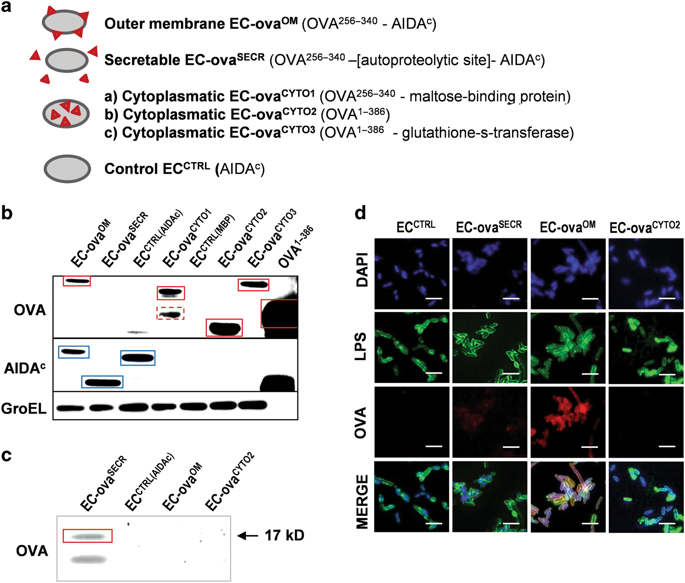当前位置:
X-MOL 学术
›
Mucosal Immunol.
›
论文详情
Our official English website, www.x-mol.net, welcomes your
feedback! (Note: you will need to create a separate account there.)
Subcellular antigen localization in commensal E. coli is critical for T cell activation and induction of specific tolerance.
Mucosal Immunology ( IF 7.9 ) Pub Date : 2019-Jan-01 , DOI: 10.1038/s41385-018-0061-0 Eveline Bennek 1 , Ana D Mandić 1 , Julien Verdier 1 , Silvia Roubrocks 1 , Oliver Pabst 2 , Niels Van Best 3 , Inga Benz 4 , Thomas Kufer 5 , Christian Trautwein 1 , Gernot Sellge 1
Mucosal Immunology ( IF 7.9 ) Pub Date : 2019-Jan-01 , DOI: 10.1038/s41385-018-0061-0 Eveline Bennek 1 , Ana D Mandić 1 , Julien Verdier 1 , Silvia Roubrocks 1 , Oliver Pabst 2 , Niels Van Best 3 , Inga Benz 4 , Thomas Kufer 5 , Christian Trautwein 1 , Gernot Sellge 1
Affiliation

|
Oral tolerance to soluble antigens is critically important for the maintenance of immunological homeostasis in the gut. The mechanisms of tolerance induction to antigens of the gut microbiota are still less well understood. Here, we investigate whether the subcellular localization of antigens within non-pathogenic E. coli has a role for its ability to induce antigen-specific tolerance. E. coli that express an ovalbumin (OVA) peptide in the cytoplasm, at the outer membrane or as secreted protein were generated. Intestinal colonization of mice with non-pathogenic E. coli expressing OVA at the membrane induced the expansion of antigen-specific Foxp3+ Tregs and mediated systemic immune tolerance. In contrast, cytoplasmic OVA was ignored by antigen-specific CD4+ T cells and failed to induce tolerance. In vitro experiments revealed that surface-displayed OVA of viable E. coli was about two times of magnitude more efficient to activate antigen-specific CD4+ T cells than soluble antigens, surface-displayed antigens of heat-killed E. coli or cytoplasmic antigen of viable or heat-killed E. coli. This effect was independent of the antigen uptake efficiency in dendritic cells. In summary, our results show that subcellular antigen localization in viable E. coli strongly influences antigen-specific CD4+ cell expansion and tolerance induction upon intestinal colonization.
中文翻译:

共生大肠杆菌中的亚细胞抗原定位对于 T 细胞激活和特异性耐受性的诱导至关重要。
对可溶性抗原的口服耐受性对于维持肠道免疫稳态至关重要。对肠道微生物群抗原的耐受性诱导机制仍然不太清楚。在这里,我们研究了抗原在非致病性大肠杆菌中的亚细胞定位是否具有诱导抗原特异性耐受的能力。产生了在细胞质、外膜或作为分泌蛋白表达卵清蛋白 (OVA) 肽的大肠杆菌。在膜上表达 OVA 的非致病性大肠杆菌在小鼠肠道中的定植诱导了抗原特异性 Foxp3 + T regs的扩增和介导的系统免疫耐受。相反,细胞质 OVA 被抗原特异性 CD4 +忽略T 细胞并未能诱导耐受。体外实验表明,活大肠杆菌的表面展示 OVA 激活抗原特异性 CD4 + T 细胞的效率比可溶性抗原、热灭活大肠杆菌的表面展示抗原或大肠杆菌的细胞质抗原高出约两倍。活的或热灭活的大肠杆菌。这种作用与树突状细胞中的抗原摄取效率无关。总之,我们的结果表明,活大肠杆菌中的亚细胞抗原定位强烈影响抗原特异性 CD4 +细胞扩增和肠道定植后的耐受性诱导。
更新日期:2019-01-26
中文翻译:

共生大肠杆菌中的亚细胞抗原定位对于 T 细胞激活和特异性耐受性的诱导至关重要。
对可溶性抗原的口服耐受性对于维持肠道免疫稳态至关重要。对肠道微生物群抗原的耐受性诱导机制仍然不太清楚。在这里,我们研究了抗原在非致病性大肠杆菌中的亚细胞定位是否具有诱导抗原特异性耐受的能力。产生了在细胞质、外膜或作为分泌蛋白表达卵清蛋白 (OVA) 肽的大肠杆菌。在膜上表达 OVA 的非致病性大肠杆菌在小鼠肠道中的定植诱导了抗原特异性 Foxp3 + T regs的扩增和介导的系统免疫耐受。相反,细胞质 OVA 被抗原特异性 CD4 +忽略T 细胞并未能诱导耐受。体外实验表明,活大肠杆菌的表面展示 OVA 激活抗原特异性 CD4 + T 细胞的效率比可溶性抗原、热灭活大肠杆菌的表面展示抗原或大肠杆菌的细胞质抗原高出约两倍。活的或热灭活的大肠杆菌。这种作用与树突状细胞中的抗原摄取效率无关。总之,我们的结果表明,活大肠杆菌中的亚细胞抗原定位强烈影响抗原特异性 CD4 +细胞扩增和肠道定植后的耐受性诱导。









































 京公网安备 11010802027423号
京公网安备 11010802027423号